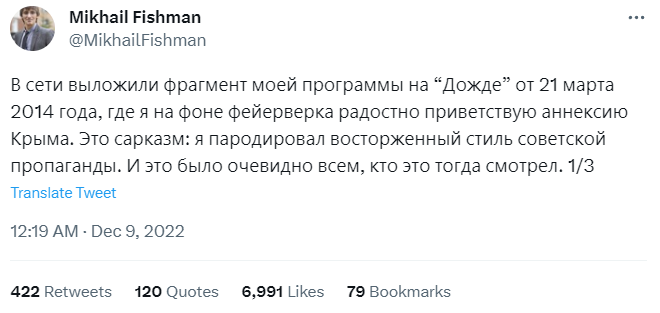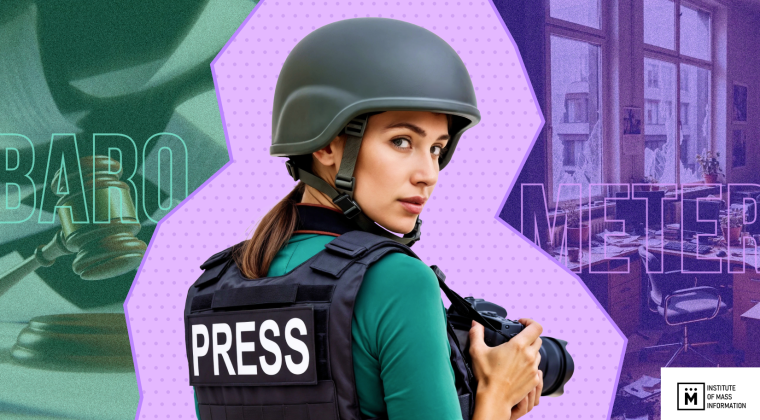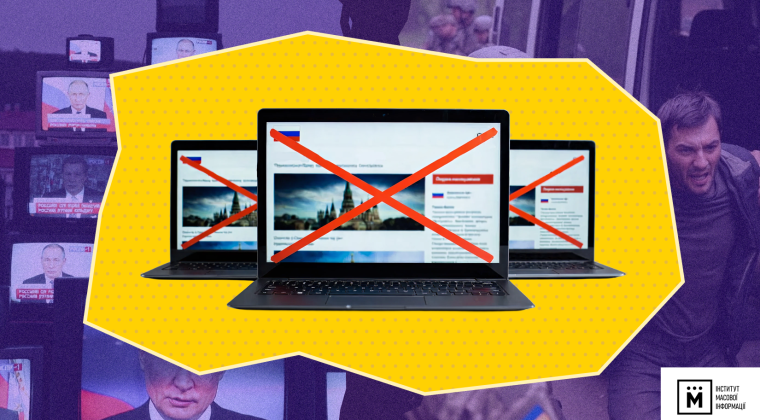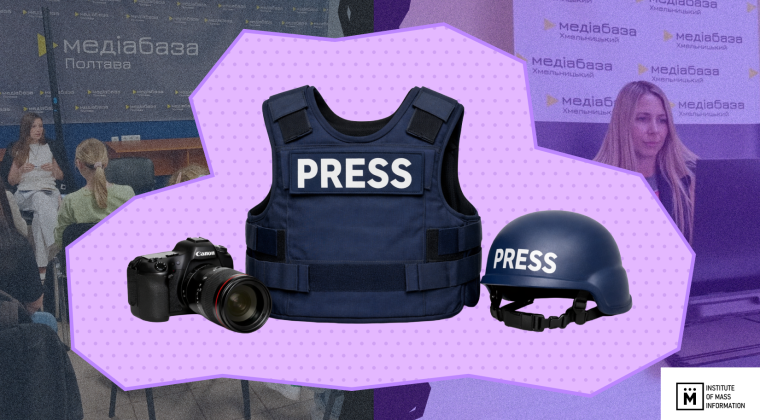Oppression and anti-Russian bias – these are the accusations brought against Europeans again by the Russian channel TV Dozhd. This is not the first time that the media outlet has condemned the West for “Russophobia”, framing the shift in attitude towards Russians as something that happened out of the blue. But could these discussions of the “bullying” Russians are facing be meant to distract the viewer from TV Dozhd’s content that violates the standards of quality reporting?
The Institute of Mass Information starts a series of articles on the market of Russian media – regardless of whether said media are currently based in Russia. We wish to study if these resources adhere to the standards of journalism, how they cover their subjects, who gets invited as an expert and whether the Kremlin propaganda narratives are being avoided.
On June 22, 2023, TV Dozhd uploaded a video titled “Hating Russians is in vogue nowadays” to their YouTube channel. In it, the channel’s host and head of information, Ekaterina Kotrikadze, accuses Eutope of blooming xenophobia: “Discussing ethnic Russians or Russian citizens, judging them, holding them to account, lining them up against the wall, banning or canceling them is in vogue now. Because it’s allowed.”
The video was triggered by a statement from the Czech Preisdent Petr Pavel. In an interview to Radio Liberty he remarked that he sympathized with Russians who had to flee their country due to Moscow’s full-scale invasion of Ukraine, but “all Russians living in Western countries should be monitored much more than in the past because they are citizens of a nation that leads an aggressive war.” Pavel mentioned Japanese people living in the US during the Second World War, who were closely surveilled by the state at the time.
In an interview to CNN the Czech President clarified that his words had not been a call for moving Russians to internment camps as US President Franklin D. Roosevelt did with Americans of Japanese descent. Pavel noted that he had mentioned Japan to provide a historical context, to show that restrictions on citizens of a war-waging country have been applied before, but his words hadn’t been an approval of Roosevelt’s policy. Moreover, the Czech President’s press office stressed that the “monitoring” remark only referred to those Russians abroad who represent “risk factors”.
Still, the Kremlin propaganda was quick to make use of Pavel’s careless remark and started spreading fake news alleging that Prague was calling on the EU to throw Russians into concentration camps. TV Dozhd host Ekaterina Kotrikadze does show Pavel’s refutation in her video, but overall it still revolves around assumptions and exaggerations as to the consequences of the Czech President’s words. Kotrikadze’s own conclusion is based on her hypotheticals as well:
“This way we are going to backroll into the past and not only Vladimir Putin will go down in history as a monster who denied progress to his citizens, but others coming out of the shadows with a red passport – hunt them down. Years later somebody will be very, very embarrassed about this, but it would be better to avoid this disgrace now.”
TV Dozhd’s team consistently denies the Russians’ collective responsibility for Russia’s war on Ukraine. Therefore, they often link the West’s restrictions imposed on Russian citizens for their silent support for the war to “xenophobia” or “Russophobia”. For instance, a TV Dozhd host has said that “the righteous anger of the victim” is nowadays being exploited as a cover up for secret grievances, complexes and trauma, adding that by “victim” she means not just Ukrainians, who are being killed and therefore can not be criticized, but everyone who has suffered under the Russian and Soviet regimes. This is pure conjecture and a manipulative interpretation of the events.
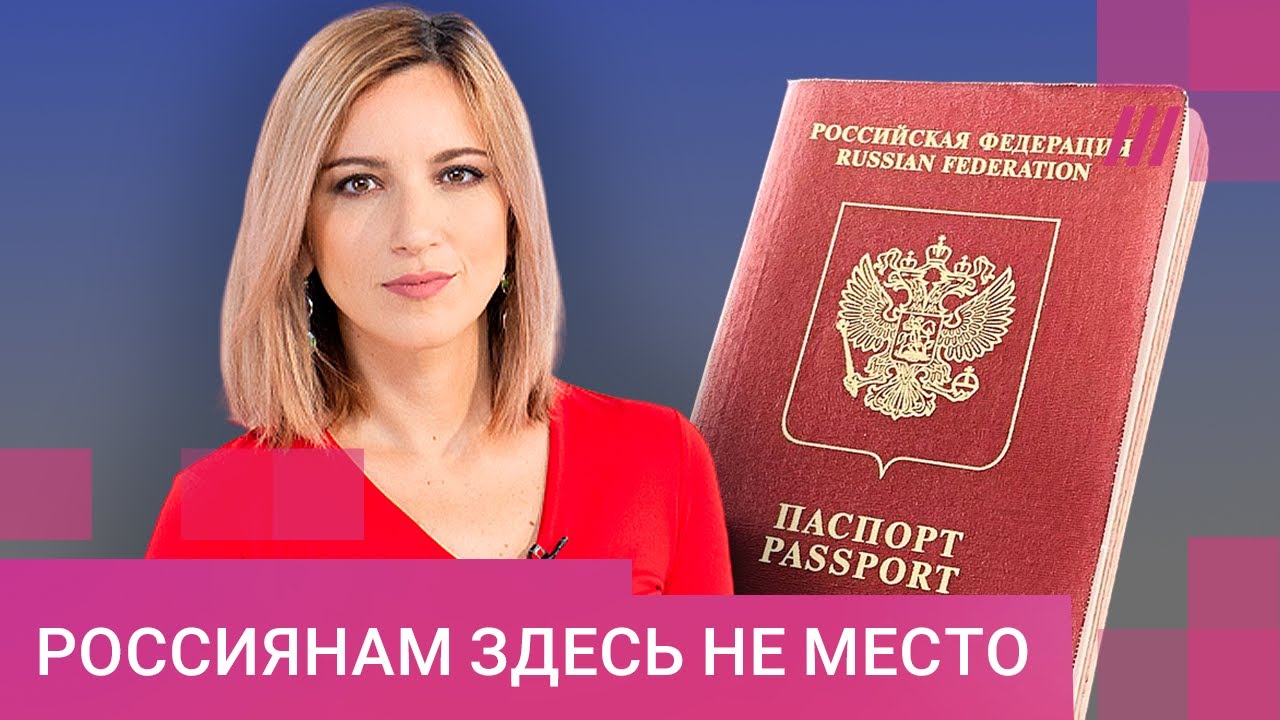
TV Dozhd’s response to Latvian regulator revoking the channel’s broadcasting license in early December 2022 due to “risks to national security and public order” was similar. Chief editor Tikhon Dziadko said that the decision made by Lativa, where the channel relocated temporarily after the start of Russia’s full-scale invasion of Ukraine, was a “farce”. TV Dozhd’s head of information Ekaterina Kotrikadze complained of a politicized approach and stressed that the channel has maintained a “crystal clear” stance on the Russian annexation of Crimea for years.
We should remind you that the license revocation was triggered by the channel displaying a map with Crimea marked as part of Russia, referring to the Russian occupying army as “our army” on the air and by a remark from TV Dozhd host Alexey Korostelyov. Speaking on the air on December 1, 2022, he asked their Russian audience to report internal issues in the Russian army to the channel. “We hope that we were able to help many soldiers with equipment and basic necessities on the frontline and such,” Korostelyov added. These words caused a backlash. On the following day TV Dozhd said that the host’s statement had been a slip of the tongue, but since it could have misled some viewers, they decided to fire Korostelyov. However, as it became clear that the National Electronic Media Council of Latvia would not change their decision on TV Dozhd’s license, the channel’s CEO Natalia Sindeyeva asked Korostelyov and everyone who had quit the channel in protest against his dismissal to come back.
Estonia and Lithuania were next to cancel TV Dozhd’s broadcasting. The Latvian regulator’s decision was welcomed by the Ukrainian Media Movement. On July 4, 2023, the Court of Riga upheld the TV Dozhd license revocation, calling it “the best decision”. Still, in February 2023, TV Dozhd obtained the Journalism Trust Initiative (JTI) certification mark. The JTI, initiated by Reporters Without Borders (RSF), involves external company Deloitte who does the audit and delivers a JTI certification (corrected on demand of RSF – ed.). The media organization remarked that the channel “has proven its independence from the Kremlin for years.”
In late December 2022, TV Dozhd obtained a European broadcasting license from the Dutch Media Authority. Unless the regulator revokes the approval, the Russian channel (now branded as TV Rain) will be able to broadcast in the EU for five years after receiving the license.
So how “clear” TV Dozhd’s stance on the Russo–Ukrainian relations and Russia’s military aggression on Ukraine is, exactly?
Medvedev and Co.: the beginnings of TV Dozhd
“Liberal”, “oppositional” – this is how some Western and Ukrainian media refer to TV Dozhd. The latter characteristic was disavowed in 2019 by the channel’s CEO Natalia Sindeyeva herself. In an interview to the YouTube channel Empatia Manuchi, which was not overtly pro-Kremlin at the time, Sindeyeva remarked that TV Dozhd was not and had never been oppositional:
“A governor could come to our show and know that nobody would ‘roast’ him. And now – and not because we would ‘roast’ anybody – our rivals, our enemies, our naysayers who did not only shut us down physically, vetted us, have also started a large-scale smear campaign against TV Dozhd, claiming that we are the opposition.”
The channel’s management and staff have repeatedly explained why their episodes feature comments from Russian officials, saying that TV Dozhd was covering different perspectives. Such a stance could be interpreted as unbiased, but only given that the journalists do not allow their speakers to promote misinformation and disinformation, ask follow-up questions and avoid flattery. However, visits by pro-state officials and Kremlin-backed actors would often turn the channel into a platform for spreading propaganda instead of contributing to its objectivity. Not to mention that uttering extremist calls can never be taken as a “perspective” or as proof of balanced coverage. Let us not get ahead of ourselves, though.
Before TV Dozhd came into existence, its founder Natalia Sindeyeva used to be the chief producer at the radio station Serebryany Dozhd, as well as the company’s shareholder. Sindeyeva claims to have invested her own money into the creation of the channel. Her husband Alexandr Vinokurov, owner of the bank KIT-Finance, was a co-investor in TV Dozhd. Forbes Russia estimated Vinokurov’s fortune from selling various assets at $230 million.
TV Dozhd (full name Dozhd. Optimistic Channel – Ed.) opened on April 27, 2010. Forbes reported that, since the channel failed to secure an agreement on cable broadcasting, the content was at first streamed online, with satellite broadcasting being added in August 2010 as part of the NTV+ package belonging to the state holding Gazprom Media.
The then President of Russia, Dmitry Medvedev, helped TV Dozhd evolve to a new level and paid a visit to the channel on April 25, 2011.
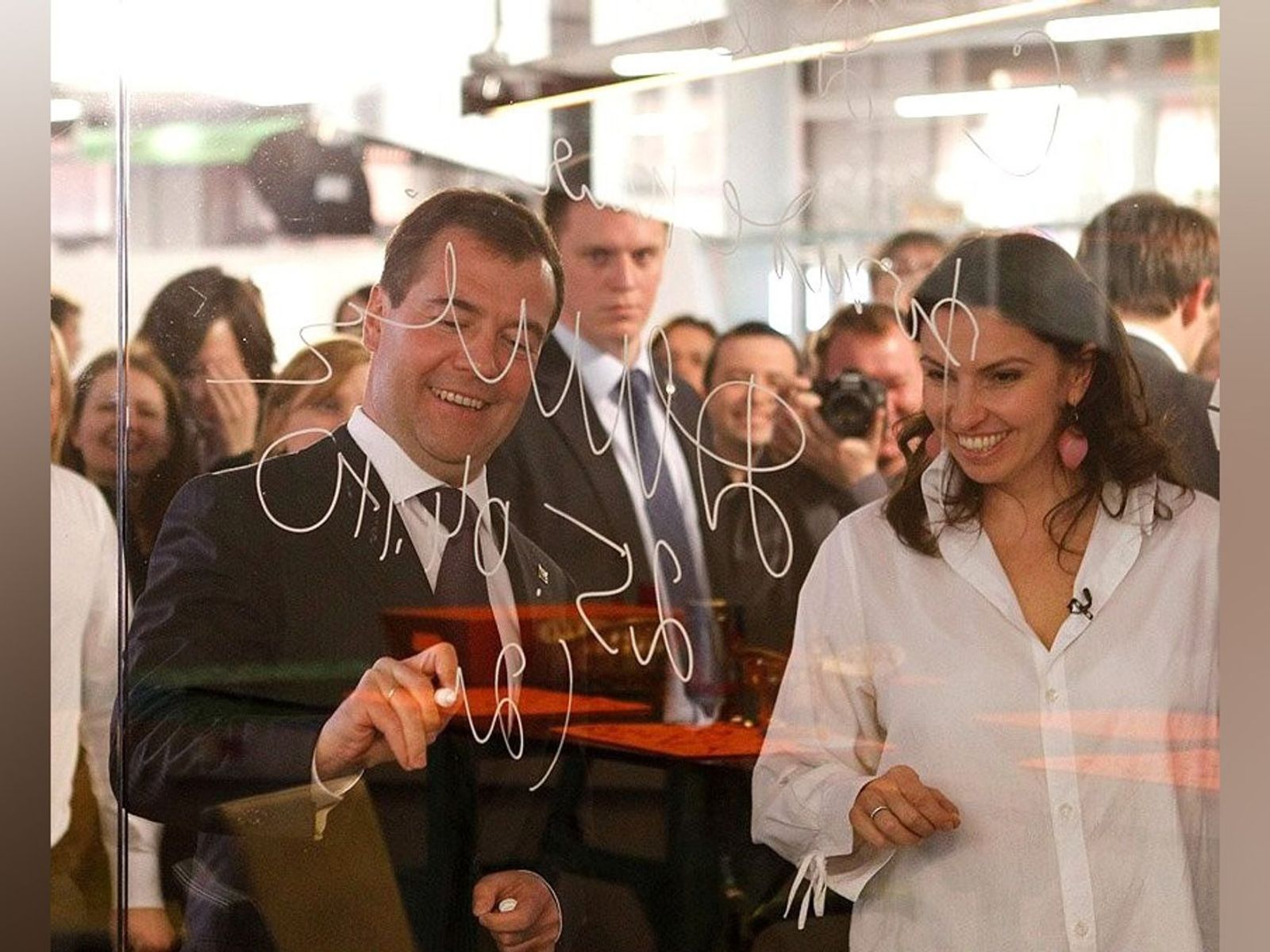
This visit was covered by Russian state news agencies and federal TV channels. “I am happy as a Tula pryanik!” said Sindeyeva, commenting on the event. Several years later she would go on to remark that after Medvedev’s visit, advertisers and officials stopped seeing TV Dozhd as a “fringe” channel. In July 2011, the cable TV operator AKADO, whose cooperation the channel had tried to secure back in 2010, finally agreed to broadcast TV Dozhd.
Medvedev’s visit was streamed live by TV Dozhd. Everything seemed a little too informal: the Russian President and the channel’s CEO whispering something to each other, giggling and even a casual peck on the cheek; Sindeyeva wearing ripped jeans instead of formal wear. In the almost 40 minutes that the President spent at the channel’s HQ, including the round table discussion, journalists asked him no pressing or even critical questions. All this implies that the visit was proceeding in a mutually benevolent climate.
It needs to be remarked that the position of Medvedev’s spokesperson in 2008–2018 was occupied by Natalia Timakova, whom Sindeyeva called a friend. TV Dozhd’s CEO has stated, however, that as of the time of Medvedev’s visit the relationship between her and Timakova was not as close.
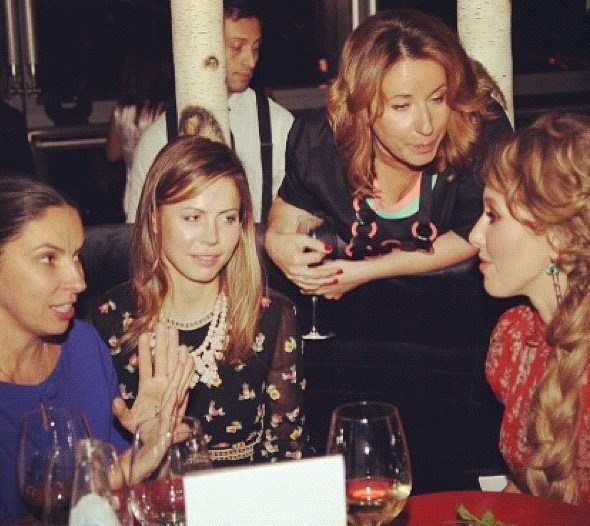
Screenshot, photo from 2013, left to right: Natalia Sindeyeva, Polina Deripaska, Natalia Timakova and Ksenia Sobchak
Sindeyeva was also friends with the president of Russia’s National Broadcaster Association, Eduard Sagalayev, not a marginal personality in the Russian media space by far. According to Sindeyeva, she has bemoaned the lack of news makers while talking with Sagalayev, and Medvedev visiting the channel was their shared dream.
It is difficult to pinpoint the moment when non-Russian media and viewers began to associate TV Dozhd with “the opposition” and who contributed to this image. Yet despite the constant demonstrative crack-downs, a channel known to be “oppositional” or “independent” that at the same time “knows how the game is played” was apparently useful to the Kremlin. So even after reporting on the Bolotnaya Square protests and the Euromaidan, after the scandalous survey about the siege of Leningrad (“Should the Red Army have surrendered Leningrad to save hundreds of thousands of lives?” – Ed.), after shutting down TV Dozhd’s cable broadcasting and designating the media outlet a “foreign agent” in 2021, the Russian establishment continued to make appearances on the channel up until Russia’s full-scale invasion of Ukraine.
One of TV Dozhd’s know-hows is hosting lectures and workshops by experts in various fields, including politicians. For instance, on May 17, 2015, TV Dozhd launched a project titled President 2042 which streamed lectures by politicians and political scientists over the course of three weeks. The channel accepted applications from Russians who were of age but under 25 (that is, were born after the fall of the USSR) to find Russia’s future president among them. It seems like the channel’s team was not counting on a government change to happen sooner than 2042. As to their plans to bid farewell to the current regime in 27 years, they said that it “would not live forever”: “In 2042, Vladimir Putin will be 90 and Dmitry Medvedev will be 77, so it’s about time they sit back in front of their TV, put on TV Dozhd and find out what kind of person the President 2042 will be.”
The participants were offered whole two “lectures” by the then head of the LDPR party, Vladimir Zhirinovsky: the first one took place in the Russian State Duma, and for the second one the official was invited to the TV Dozhd studio. The meetings had no moderator and were not interrupted even as Zhirinovsky was promoting the Kremlin’s aggressive propaganda and disinformation or uttered extremist calls, encouraging Russians to commit crimes against Ukrainians.
At first, Zhirinovsky claimed that the Russian government uses violence domestically, which is a good thing, because without it Russia will crumble as the USSR once did. Then, he said that an army’s purpose is not to defend, but to die, kill and attack other lands: “The army is for war! War means killing! […] You say you don’t want soldiers to die? But that’s inevitable! Why did Ukraine need to have a revolution?! Life was better with Yanukovich! Now it’s worse! But they committed a revolution. […] Troops are moving everywhere – training, fighting.” And when one of the “President 2042” participants objected, saying that a state should train its troops on its own territory, Zhirinovsky called this line of thinking “onanism”.
“The training is done wherever there is a threat to the state! […] Let’s all sit at home, cancel everything, no soldiers! What will we do? Cross-stitch?! […] You don’t give a damn about Crimea, about Russian people?! Have you been to Crimea? There are Russian people there. They would be abused now! As they are being abused in the Donbas. Tortured, killed, driven out of Crimea!” the LDPR leader said, justifying Russia’s war crimes in Ukraine.
During his next visit to the TV Dozhd studio, Zhirinovsky laid out the key points of his election campaign. Namely, he promised to conquer Ukraine and essentially enslave Ukrainians if need be:
“I will end the war in Ukraine, and the flag flying over Kyiv will be Russian! […] We will provide jobs to all our unemployed people. Not enough? We will bring millions of people from Ukraine to live and work here! […] Only force! A rocket cudgel! Then we will be respected by everyone and get everything we want! […] How are we being portrayed now? Russian ‘vatniks’: drinking, cussing, idling away, incapable of anything. We are idiots. We are the laughingstock – these are history textbooks for all schoolchildren in Ukraine. They hate us these days, they were raised to believe that we are their enemies! That we are Asians! That we must be exterminated!”
The spokeswoman for the Russian MFA, Maria Zakharova, has also repeatedly visited TV Dozhd. In August 2015 (after the end of “President 2042”) she was invited to give a “workshop” on the channel. It is unclear what exactly Zakharova was supposed to teach. There is no information about the event on the TV Dozhd website and YouTube channel; there is, however, a video of the channel’s host Anton Zhelnov confirming that it did happen.
On December 22 of the same year Zakharova was a guest at the TV Dozhd show Hard Day’s Night. The conversation did not sound much like hard talk, however. “Delighted to greet our guest. Today it’s Maria Zakharova, the official spokeswoman for the Russian MFA, or the Director of the Information and Press Department, as your position – Your position – is formally called,” said the then editor-in-chief Mikhail Zygar, using the informal “you” pronoun (“ty”) at first and then correcting himself and using the formal “vy”. “Please, ‘ty’. We all use ‘ty’ in real life, after all,” Zakharova asked. In short, the conversation with the MFA representative was an illusion of hard talk. Journalists from various outlets would point out the “undiplomatic” language in Zakharova’s social media posts and then immediately ask why there was less news about Ukraine, namely about the “Banderites”, on the department’s agenda. The way the interview ended could rival the 2011 Medvedev visit in how casual it was: the journalists had a glass of red wine with Zakharova. The spokeswoman made a toast: “Let us call each other for informal reasons more often than not, to discuss the Instagrams and the Facebooks, not the transfer of these or those weapons or anything related to nukes.”
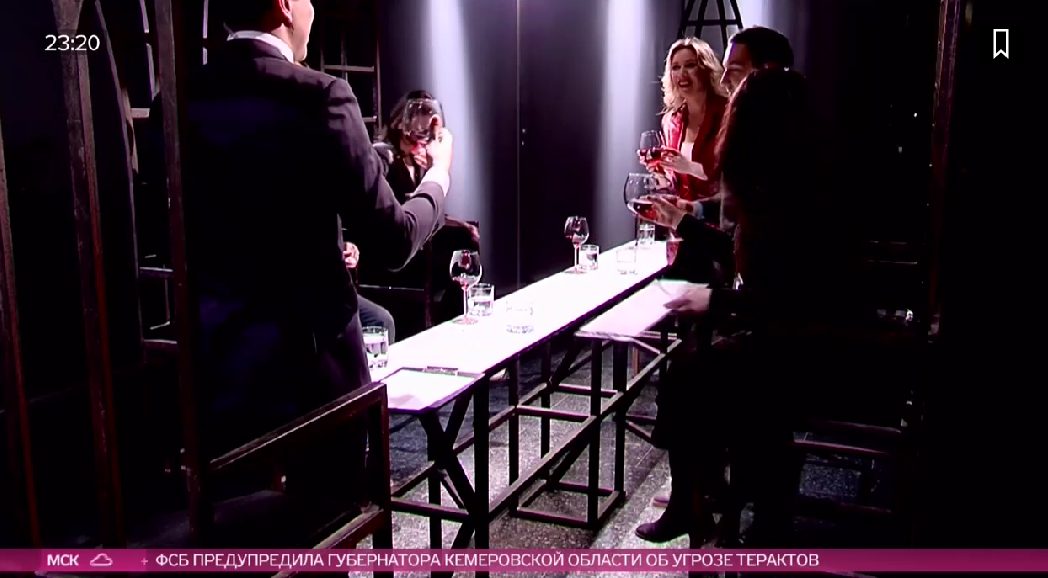
Overall, TV Dozhd did invite persons with various political viewpoints to speak or lecture. Perhaps this, contrasted with the monotony of the federal channels, is what helped the channel attract some “liberal” audience. All the while, the channel invited fringe figures, propagandists and war criminals to speak, claiming it was “unbiased journalism”.
Let us take a “Sobchak. Live” episode that aired on November 13, 2014, as an example. It featured a pro-Russian insurgent leader and the Kremlin’s henchman, Alexandr Boroday, as Ksenia Sobchak’s guest. He was introduced as “the former prime minister of the Donetsk People’s Republic” – a sort of an attempt to legitimize the paramilitary group “DPR” and its representatives. During the interview, Sobchak not just never opposed, but even played along with the propaganda and disinformation pushed by Boroday. She was silent as the terrorist leader spoke about the “fratricidal civil war” on the Donbas. The channel provided no on-screen notes refuting Boroday’s words, either. Instead of asking blunt questions about the Malaysian Boeing falling in Donetsk oblast, Sobchak invited the Kremlin henchman to explain how he managed to “resolve” the situation, what he felt upon learning about the catastrophe, what worried him the most after February 2014. All in all, it was a “hearty” conversation of no societal significance which was meant to make the aggressor more sympathetic.
“Reunion and endless friendship!”: TV Dozhd’s coverage of the Russian occupation of Crimea and Sevastopol
Lately TV Dozhd has been intently stressing that Russia has annexed Crimea – the channel usually shies away from the word “occupation” in this context and claims that the employees have always realized and opposed that move. But if that is the case, why has TV Dozhd been repeatedly suspected of being supportive of the occupation?
For reference: Ukraine banned the channel in January 2017 – long before TV Dozhd was fined by Latvia for displaying a map with Crimea marked as part of Russia. The reasons back then included another map with a Russian Crimea, which implied that the channel did not recognize Ukraine’s borders, and the fact that TV Dozhd never provided the NCTRB with a translated version of their content without Russian commercials. In 2022, the channel claimed that the map incident in Latvia was a “technical mishap”, and in 2017 they said that TV Dozhd was complying with the Russian law. In any case, TV Dozhd did not stop at misleading maps while legitimizing the Russian occupation of Crimea.
On March 21, 2014, TV Dozhd presenter Mikhail Fishman opened his show “Et Cetera” by congratulating the audience on Crimea’s “reunion” with Russia.
“Today is a special day! A day that will go down in history! A day when all Russians as one greet their new friends, new brothers, new neighbors, new citizens of our large, great Motherland. Their difficult journey is over, the hardships of timelessness, of alienation from history and from their home country are over. In the solemn atmosphere of reunion and endless friendship, the Russian President and the representative of the Crimean public signed the Agreement on Crimea’s Accession into Russia!” – this is but an excerpt of Fishman’s speech, which went on for 1 minute and 43 seconds.
There were no further disclaimers from Fishman or the channel. The “fiery” speech was followed by news reports where Russia’s unlawful occupation of Crimea was called “accession”. Yet, for some reason this incident never gained traction. In February 2022, shortly after TV Dozhd’s Latvian license got revoked, Fishman’s speech was uploaded on YouTube. The host hurriedly explained himself:
“An excerpt of my show on TV Dozhd from March 21, 2014, where I joyously cheer on the annexation of Crimea as fireworks go off in the background, has been posted online. This was sarcasm: I was parodying the ecstatic style of Soviet propaganda. It was obvious to anyone watching it back then.”
Indeed, Fishman’s speech sounds a little too elated. However, even if his explanation is to be believed, TV Dozhd’s decision to report on the annexation “agreement” in this way is at best an attempt to “have a foot in both camps” and at worst a gross violation of journalist standards. The audience of a resource that claims to be a news channel should not have to know the nuances of psychology and actorship or read the reporter’s mind. If Fishman finished off his speech by announcing that he had “pranked” the viewer, the whole thing could have been written off as attention bait. Otherwise, it is manipulation and blame shifting.
But it does not end here. TV Dozhd has shared fake news and propaganda from pro-government resources without providing sufficient context or explanation as to why this content is misinformation. After the sham referendum in Crimea TV Dozhd posted an address from the fugitive Ukrainian president Victor Yanukovych, who called on the Ukrainian people to hold such “referendums” in all regions of the country.

And here is an article announcing a “celebration” of the annexation in Crimea and framing it as a “news report”:
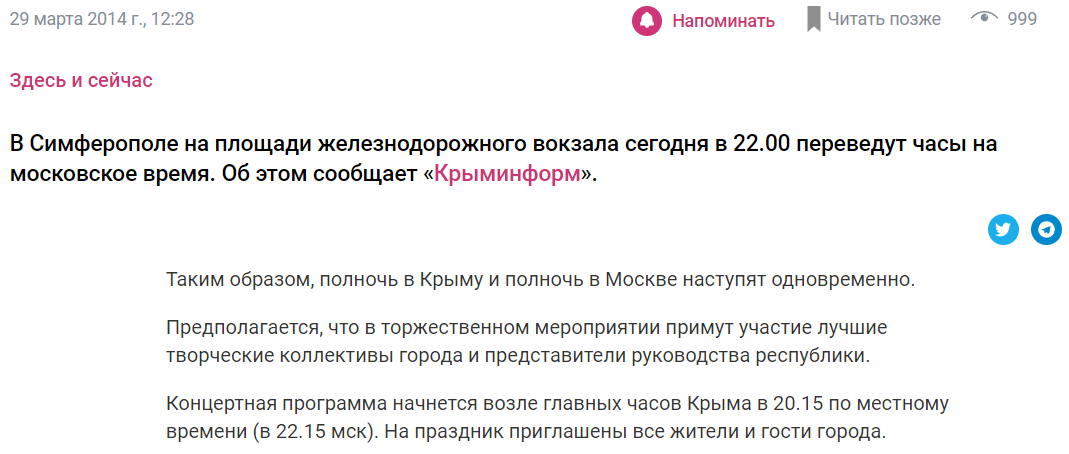
Furthermore, TV Dozhd has taken interviews and comments from representatives of the Moscow-installed Crimean authorities. Journalists and hosts made no mention of these persons being controlled by the Kremlin and having been appointed as a result of Russia’s unlawful actions that violate international law. For instance, the Kremlin’s henchman Sergey Aksyonov told Ksenia Sobchak and Mikhail Zygar about the “fratricidal” war in the Donbas and claimed that the Ukrainian government aims to “harm” Crimea and the people of Ukraine’s southeast.
Finally, there was the one-sided September 24, 2014 report on the live show organized in Moscow for Crimeans. All the people featured in the video are happy with the annexation, saying, in varying words, that Ukraine didn’t “take care” of Crimea the way Russia does. The Kremlin-appointed “minister of culture” of the occupied peninsula, Alla Sokolova, burst into tears of joy: “Such a bliss that these children will grow up under a peaceful sky! It’s so horrible when your children are being shot at!”
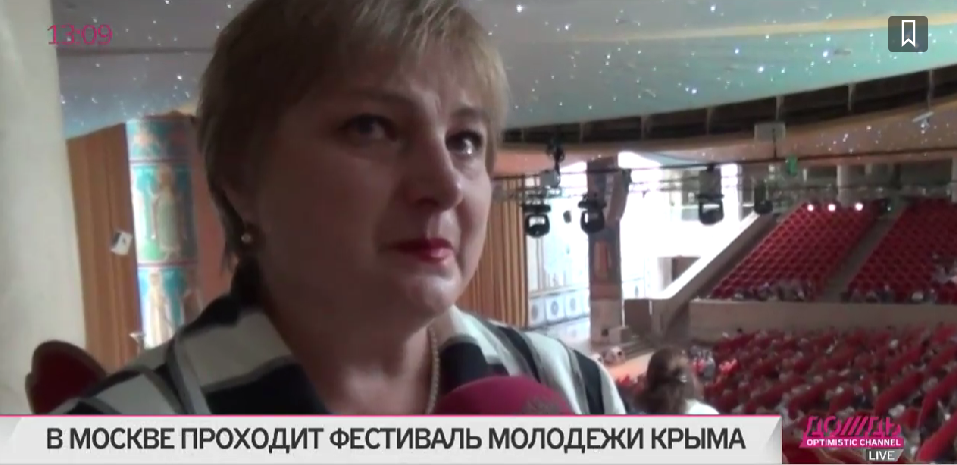
TV Dozhd on the quasi-republics
TV Dozhd’s coverage of the war in the Donbas, which has been ongoing since 2014, has been riddled with the same shortcomings as their reports on Crimea. For example, the channel has used the propaganda “newspeak”, such as calling the Kremlin-backed pro-Russian insurgents “militiamen”, quoted pro-state mass media and attempted to legitimize the Russian war criminals. Let us cite several TV Dozhd articles from different years and list their problematic aspects:
- “DPR” leader Denis Pushylin on TV Dozhd: “I have met Surkov, Matvienko and Malofeyev; we have been promised assistance” (an interview with the Kremlin-backed leader of the illegal armed group “DPR”, Denis Pushylin; streaming propaganda and disinformation on the air, 17.06.2014)
- “DPR” representative Denis Pushylin: “It is not the militiamen who are dying under shelling in Donetsk, but civilians” (an interview with the Kremlin-backed leader of the illegal armed group “DPR”, Denis Pushylin; streaming propaganda and disinformation on the air, 18.01.2015)
- The Kremlin says the evidence of the separatists’ non-involvement in the MH17 crash is indisputable (sharing fake news from the pro-Kremlin news agency Interfax which cites Putin’s spokesman Dmitry Peskov, 28.09.2016)
- DPR reveals the evidence of the Ukrainian special services being involved in Givi’s murder (sharing fake news from a media outlet affiliated with the illegal armed group “DPR”, 10.02.2017)
- Putin has first talks with the heads of DPR and LPR (legitimizing the Russian war criminals, quoting the state-affiliated news agency RIA Novosti which cites Putin’s spokesman Dmitry Peskov, 15.11.2017).
We emphasize: the Russian channel which came to fame as a “liberal” outlet has long been framing the events in the Donbas as a “civil war” between “militiamen” or “separatists” and the Ukrainian army. Such coverage continued even after July 17, 2014, when a Malaysian Boeing was shot down in Donetsk oblast. For instance, in a September 2, 2014 episode, TV Dozhd journalist Timur Olevskiy, who was reporting on the Ilovaysk battles, was surprised to hear Ukrainian POWs say that they were fighting the Russian army.
“Skirmishes of some sort continue between the Ukrainian army and – it is no longer clear who, exactly, an opponent advancing from the ‘Ilovaysk pocket’. The battle even looks stunning from a few kilometers away. The smoke and the field… But it’s a real war happening down there. I came back to Mariupol and learned that the volunteers helping local territorial battalions have been hard at work today, digging trenches and preparing for a possible offensive from every direction – by forces which they for some reason call the Russian army here,” Olevskiy said.
As you know, the battles for Ilovaysk (Donetsk oblast) lasted from mid-August to early September 2014. Back then Russia and Ukraine agreed on a “green corridor” for the Ukrainian soldiers encircled by the Kremlin-controlled militants and Russia’s regular troops. On August 29 the Russian side reneged on the agreement, killing 366 Ukrainians, wounding 429 and taking 128 captive.
A year after the Ilovaysk tragedy, TV Dozhd reporters went to a rehab center in Rostov-on-Don to film a story about the so-called militiamen staying there. The channel boasted of being the first Russian journalist crew to be allowed in the building.
The channel has also filmed episodes about Russians who claimed to have fought in the Donbas as “volunteers”. In August 2015, they released a report on Vyacheslav Isayev, who had fought against Ukrainians as part of a private military company (the company’s name is not mentioned in the report – Ed.). Isayev claimed that he had gone to the Donbas “following the heart’s call, to help Russian people.” The man spoke about the internal conflicts among the Russian forces and how those affected the common soldiers. Isayev finished by addressing Putin: “Vladimir Vladimirovich, they’re not worth it, really. All this is not worth our lives, the lives of Russian people at all. Let them sort it out by themselves.” Again, TV Dozhd provided no clarification as to the episode, so one gets the impression that there is a “civil war” going on in the Donbas and the Russian government is being asked to stop its “missionary” efforts and not help the people of the Donbas because Russians end up suffering from it.
“Stop panic-mongering”: TV Dozhd on the eve of Russia’s full-scale invasion
On February 10, 2022, TV Dozhd invited the MFA spokeswoman Maria Zakharova to discuss the risk of Russia’s full-scale invasion of Ukraine. Did the channel’s team not realize that Zakharova would be pushing the narrative that benefits the Kremlin? It is unacceptable and manipulative to rely on a source that has been consistently spreading misinformation and propaganda for the sake of “balance of perspectives”. By the time the host, Kotrikadze, spoke to Zakharova, nearly 70% of the military units amassed along the Ukrainian border by Russia had been identified. The official, however, called on the Western media (above all) to “stop panic-mongering”: “If this falls to our side, any aggression is out of the question, but it has been repeatedly reported that everything we are witnessing right now looks like the West preparing a provocation.”
On the eve of the full-scale invasion TV Dozhd was still sharing fake news such as “The LPR reports an attack by Ukraine resulted in civilian deaths”, which cites the federal propaganda agency TASS.
On February 23, 2022, after Russia officially recognized the illegal armed formations “DPR” and “LPR”, TV Dozhd host Anna Mongayt spoke to a State Duma deputy from the communist party, Nina Ostanina. It was a CPRF faction that initiated an appeal to Putin regarding the quasirepublics. The deputy remarked that the “DPR” and the “LPR” should have been recognized eight years ago, which is how long the Donbas has been suffering according to her. Mongayt did nothing to challenge the Russian propaganda. Instead of clarifying who exactly is making Ukraine suffer, the host said that “both sides are to blame: Russia as well as Ukraine.”
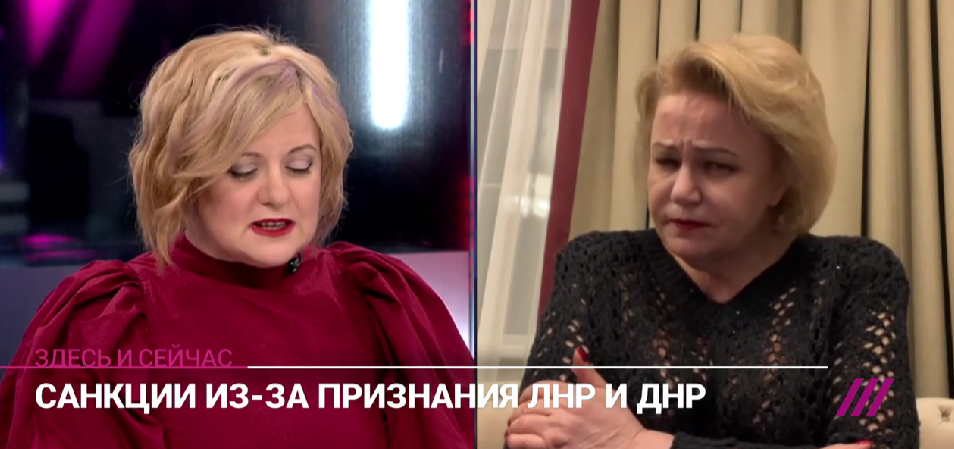
On Bucha and collective responsibility: TV Dozhd after February 24
Following Russia’s full-scale invasion of Ukraine, TV Dozhd host and chief editor Tikhon Dziadko immediately called the “special operation” a war and admitted having been wrong about the invasion. The channel showed footage of various Ukrainian cities being shelled by Russia. Dziadko mentioned that the hostilities are happening beyond Donetsk and Luhansk oblasts, contrary to what the Russian authorities were saying.
Yet, the channel did not stop spreading fake news, citing unreliable or dubious sources and manipulating information. For instance, on February 26 journalist Alina Didkovska first read the Russian FSB’s report alleging that Ukraine was shelling the Rostov region, and then, citing the pro-Kremlin Telegram channel Readovka as if it were a credible source, noted that it had also wrote about Ukraine shelling the Rostov military airfield.
And when the terrible footage of Russia’s war crimes in Bucha (Kyiv oblast) went viral around the world, TV Dozhd declared openly that it was the Russian army’s deed. This, too, featured an element of manipulation, however. The host, Mikhail Fishman, summarized the report on Bucha by saying that “both Putin and Lavrov know that Bucha is no fake, no hoax, no provocation. Just as they know who poisoned Navalny with ‘novichok’ in August 2020.” The two incidents can not be compared and doing so is cynical.
Yet, the married couple of TV Dozhd hosts, Ekaterina Kotrikadze and Tikhon Dziadko, were even more irresponsible when covering the Bucha massacre on their own YouTube channel. As of July 10, 2023, Kotrikadze Dziadko has 181 thousand subscribers. The episode on the Bucha war crimes first shows the horrific photos and videos from the de-occupied town and debunks the Kremlin propaganda on the war crimes being “a hoax”. However, the authors fail to mention who is to blame for the deaths of the Ukrainian civilians. Kotrikadze and Dziadko then go on to discuss the events in Bucha with the Russian journalist Maxim Tovkaylo, who had not even been there after the de-occupation.
“The Russian side’s proof that the Russian army has nothing to do with the massacre and that it is all a hoax does not look very convincing. […] I am no expert in forensics. As an absolute amateur, I was wondering why the clothes on some bodies are not all that dusty if the corpses have been lying outside for days. But you have to compare the photos to figure that out. I did not – you need paid subscriptions for that, and I had no time [to examine them] from different angles,” – said Tovkaylo.
Then the journalist stressed that Russia had provided no evidence of their innocence and that the Kremlin’s claims that the corpses in the videos are moving do not hold water. However, when it comes to sensitive topics like this, speculating on the clothes “not looking dusty enough” is unprofessional and manipulative. Not to mention the fact that a person with no expertise who has not been to the crime scene and has not studied the photos from different angles is not qualified to make any conclusions about the tragedy.
Despite their considerable transgressions, spreading misinformation and the Kremlin’s propaganda, TV Dozhd continues to insist their reputation is unsullied. Multiple members of the channel’s team, including Ekaterina Kotrikadze and Anna Mongayt, vehemently oppose the idea that Russians are collectively responsible for the heinous war on Ukraine and speak about Russians being “bullied”.
The channel’s employees often try to justify the lack of mass anti-Kremlin protests in Russia by claiming that the aggressor state’s citizens are silent because they fear imprisonment and terror. There is no proof of that, however, so it all comes down to conjectures and manipulating statistics. For example, in the video “Is the war Putin’s or Russians’?” former State Duma deputy Dmitry Gudkov mentions two opinion polls by the non-profit Levada Center which date back to before the full-scale invasion. Gudkov argues that “this war is being waged by a person with a wounded ego,” adding that 50% of Russians considered Ukrainians a “brother nation” to substantiate his claim. However, this propaganda talking point is perfectly compatible with another one: about Russia “rescuing” their Ukrainian “brothers” from mythical “Nazis”. Moreover, neither Gudkov nor TV Dozhd host Mikhail Kozyrev, who moderated the conversation, made any mention of Levada’s other opinion poll which showed 73% of respondents being supportive of Russia’s actions in Ukraine.
***
The Institute of Mass Information stresses the gross violations of journalist standards done by the Russian channel TV Dozhd. We call on the international media organizations and European broadcasting regulators to be mindful of all media resources and not label outlets as “liberal” or “oppositional” just for being critical of the Kremlin’s decision to invade Ukraine.

